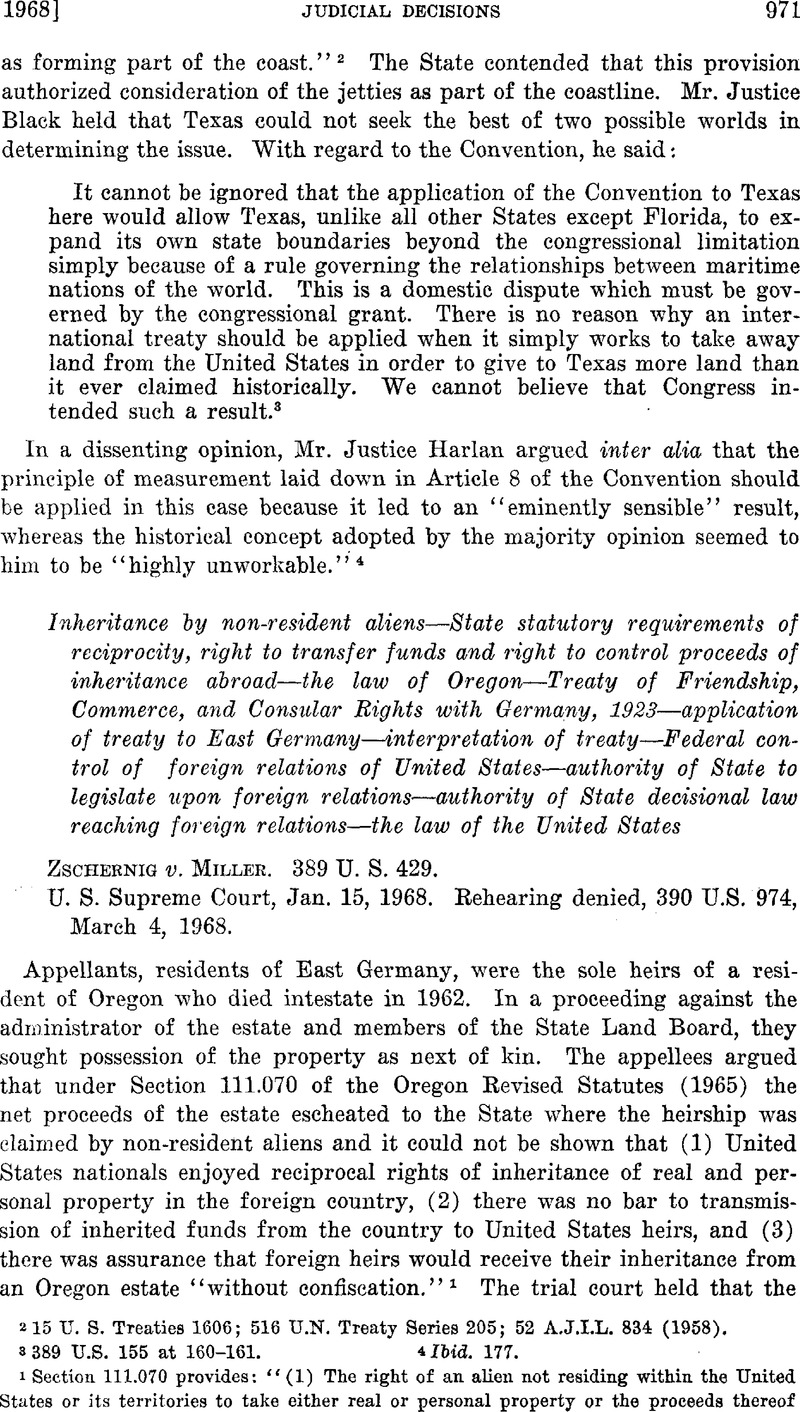No CrossRef data available.
Article contents
Inheritance by non-resident aliens—State statutory requirements ofreciprocity, right to transfer funds and right to control proceeds ofinheritance abroad—the law of Oregon—Treaty of Friendship,Commerce, and Consular Bights with Germany, 1923—applicationof treaty to East Germany—interpretation of treaty—Federal controlof foreign relations of United States—authority of State tolegislate upon foreign relations—authority of State decisional lawreaching foreign relations—the law of the United States
Published online by Cambridge University Press: 28 March 2017
Abstract

- Type
- Judicial Decisions
- Information
- Copyright
- Copyright © American Society of International Law 1968
References
1 Section 111.070 provides: “ (1) The right of an alien not residing within the United States or its territories to take either real or personal property or the proceeds thereof in this state by succession or testamentary disposition, upon the same terms and conditions as inhabitants and citizens of the United States, is dependent in each case: (a) Upon the existence of a reciprocal right upon the part of citizens of the United States to take real and personal property and the proceeds thereof upon the same terms and conditions as inhabitants and citizens of the country of which such alien is an inhabitant or citizen; (b) Upon the rights of citizens of the United States to receive by payment to them within the United States or its territories money originating from the estates of persons dying within such foreign country; and (c) Upon proof that such foreign heirs, distributees, devisees or legatees may receive the benefit, use or control of money or property from estates of persons dying in this state without confiscation, in whole or in part, by the governments of such foreign countries. (2) The burden is upon such non-resident alien to establish the fact of existence of the reciprocal rights set forth in subsection (1) of this section. (3) If such reciprocal rights are not found to exist and if no heir, devisee or legatee other than such alien is found eligible to take such property, the property shall be disposed of as escheated property.” (Footnote by court. Unless otherwise indicated, footnotes to opinion have been omitted.)
2 44 Stat. 2132; 52 League of Nations Treaty Series 133. Article IV provides: “Where, on the death of any person holding real or other immovable property or interests therein within the territories of one High Contracting Party, such property or interests therein would, by the laws of the country or by a testamentary disposition, descend or pass to a national of the other High Contracting Party, whether resident or non-resident, were he not disqualified by the laws of the country where such property or interest therein is or are situated, such national shall be allowed a term of three years in which to sell the same, this term to be reasonably prolonged if circumstances render it necessary, and withdraw the proceeds thereof, without restraint or interference, and exempt from any succession, probate or administrative duties or charges other than those which may be imposed in like cases upon the national of the country from which such proceeds may be drawn. “Nationals of either High Contracting Party may have full power to dispose of their personal property of every kind within the territories of the other, by testament, donation, or otherwise, and their heirs, legatees and donees, of whatsoever nationality, whether resident or non-resident, shall succeed to such personal property, and may take possession thereof, either by themselves or by others acting for them, and retain or dispose of the same at their pleasure subject to the payment of such duties or charges only as the nationals of the High Contracting Party within whose territory such property may be or belong shall be liable to pay in like cases.” (Quoted in footnote by court.)
3 331 U. S. 503 (1947); 42 A.J.I.L. 201 (1948).
4 389 U.S. 429 at 432.
5 Ibid. 437. The court cited the following cases inter alia: Oregon: State Land Board v. Kolovrat, 349 Pac.2d 255, rev'd other grounds sub nom. Kolovrat v. Oregon, 366 U. S. 187 (1961), 55 A.J.I.L. 983 (1961); State Land Board v. Pekarek, 378 Pae.2d 734; State By and Through State Land Board v. Eogers, 347 Pac.2d 57; Clostermann v. Schmidt, 332 Pac.2d 1036; In re Estate of Krachler, 263 Pac.2d 769; California: Estate of Gogabashvele, 16 Cal. Eptr. 77, disapproved in Estate of Larkin, 416 Pac.2d 473 and In re Estate of Chichernea, 424 Pac.2d 687 (1967), 61 A.J.I.L. 1067 (1967); Pennsylvania: Belemeehich's Estate, 192 At.2d, 740, rev'd sub nom. Consul Genera] of Yugoslavia at Pittsburgh v. Pennsylvania, 375 U. S. 395 (1964), 58 A.J.I.L. 516 (1964). The Court also noted the following articles on the subject: Heyman, “The Nonresident Alien's Bight to Succession under the ‘Iron Curtain Bule,’ “ 52 Northwestern TJ. Law Bev. 221 (1957); Berman, “Soviet Heirs in American Courts,” 62 Col. Law Bev. 257 (1962). 389 U. S. 429 at 435-439.
6 Cited note 5.
7 Ibid.
8 312 U. S. 52, 61 S.Ct. 399 (1941); 35 A.J.I.L. 555 (1941).
9 53 A.J.I.L. 171 (1959).
10 389 TJ. S. 429 at 440-441.
11 Ibid 442,




